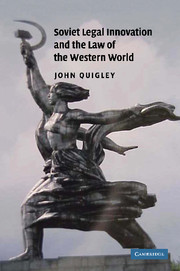Book contents
- Frontmatter
- Contents
- Abbreviations
- Preface
- Acknowledgments
- PART ONE THE SOVIET CHALLENGE
- PART TWO THE WEST ACCOMMODATES
- 8 Panic in the Palace
- 9 Enter the Working Class
- 10 Social Welfare Rights
- 11 The State and the Economy
- 12 Equality Comes to the Family
- 13 Child-Bearing and Rights of Children
- 14 Racial Equality
- 15 Crime and Punishment
- PART THREE THE BOURGEOIS INTERNATIONAL ORDER
- PART FOUR LAW BEYOND THE COLD WAR
- Notes
- Bibliography
- Index
11 - The State and the Economy
Published online by Cambridge University Press: 27 July 2009
- Frontmatter
- Contents
- Abbreviations
- Preface
- Acknowledgments
- PART ONE THE SOVIET CHALLENGE
- PART TWO THE WEST ACCOMMODATES
- 8 Panic in the Palace
- 9 Enter the Working Class
- 10 Social Welfare Rights
- 11 The State and the Economy
- 12 Equality Comes to the Family
- 13 Child-Bearing and Rights of Children
- 14 Racial Equality
- 15 Crime and Punishment
- PART THREE THE BOURGEOIS INTERNATIONAL ORDER
- PART FOUR LAW BEYOND THE COLD WAR
- Notes
- Bibliography
- Index
Summary
Despite the long-term vision of the withering away of the state, the Soviet concept of state responsibility for provision of services implied a strong role for the state. As a planned economy replaced private industry and commerce under the Soviet government, it became apparent that the state would play a major part in organizing the life of Soviet society.
During the 1930s, the Soviet government established a political and economic order based on a high concentration of both political and economic authority. The Soviet government directed the nation's economy, investing profits to promote industrialization. To solidify that political and economic order, it gave itself the power to make its new economic order function. Strong authority was exercised by a single political party, the Communist Party of the Soviet Union, and by the executive branch of government. Governmental planning of the economy involved strong direction from the central authorities.
In substantive law, the most visible changes were in commercial law. As the state assumed the administration of the economy, it established legal forms for commercial activity within the state sector.
The theory behind centralization was to build society to a point at which it could satisfy the needs of all its members on a basis of equality, and which would set the basis for a drastic reduction in governmental authority. All would receive what they need, rather than receive on the basis of what they produce.
- Type
- Chapter
- Information
- Soviet Legal Innovation and the Law of the Western World , pp. 95 - 102Publisher: Cambridge University PressPrint publication year: 2007



